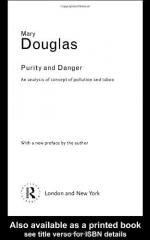|
This section contains 398 words (approx. 1 page at 400 words per page) |

|
Chapter 2 Summary and Analysis
Douglas examines concepts of hygiene as part of rituals based on practical health concerns, where smells are made tolerant and washings are part of separations to avoid disease and benefit in terms of health and life longevity. Isolation is necessary for recovery and provision of adequate care. Using certain ways of handling food and dirty things is part of symbolic meanings conveyed through customs. These meanings may be dictated by health concerns, but essentially are based on tradition involved in medical materialism. Douglas attributes practical medical knowledge to hygienic rules. Such rules also evolve around certain diets and ways to handle meat. Flesh can transmit disease and its toxic influence has been partly confirmed by pharmacologists. Medical materialism based on practical health routines has been part of medical operations and procedures of various ancient civilizations. Sumerian civilization employed medical operations and...
(read more from the Chapter 2 Summary)
|
This section contains 398 words (approx. 1 page at 400 words per page) |

|




